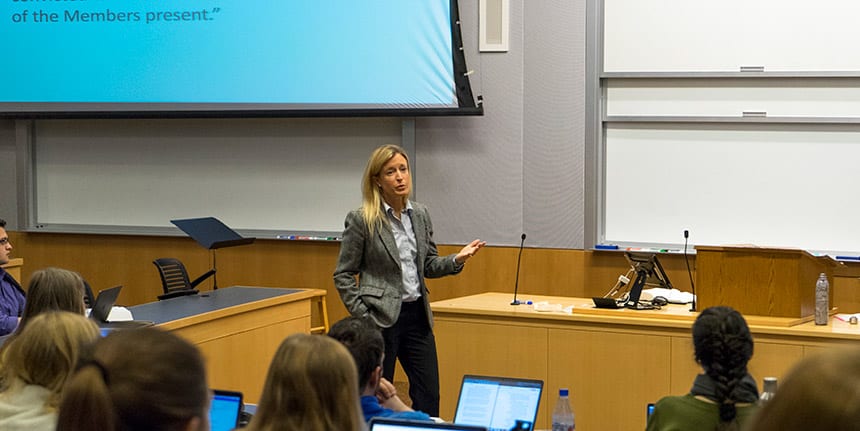
By Andrew Cohen
Professor Amanda Tyler’s passion for educating—and commitment to those who benefit from it—is unmistakable.
“Teaching is the most important thing we do as law professors because our greatest legacy is our students,” says Tyler, who will receive this year’s Berkeley Law Rutter Award for Teaching Distinction. “And our students are quite simply extraordinary.”
Current and former students use similar adjectives to describe Tyler, who joined Berkeley Law in 2012 after eight years at George Washington University.
“She’s a phenomenal professor,” says Jordan Bock ’17, who took Civil Procedure and a Supreme Court seminar with Tyler and spent two years as her research assistant. “I had no idea what Civil Procedure was when I started 1L year, but a couple of days into Professor Tyler’s class I was totally hooked—both on the subject and on the law more generally.”
Established in 1995 by the late William Rutter, a philanthropist, lawyer, educator and author, the award honors an instructor who inspires students and demonstrates a deep commitment to teaching.
Shaun Ossei-Owusu ’16, now a professor at the University of Pennsylvania Carey Law School, notes that while Civil Procedure can be “notoriously foreign and seemingly dry” for many, Tyler made it anything but.
“Her ability to enliven the material, connect it to subtle policy concerns, and distill it through the lens of what our future legal practices would look like was remarkable,” he says. “That class, and the two others I would take with her afterward, gave me great lessons on law and perhaps more importantly, teaching.”
Abundant accolades
Tyler’s teaching and research interests include the Supreme Court, federal courts, constitutional law, civil procedure, and statutory interpretation. Her 2017 book, Habeas Corpus in Wartime: From the Tower of London to Guantanamo Bay, was the subject of multiple conferences and a finalist for the ABA’s prestigious Silver Gavel Award.
Tyler earned her law degree at Harvard, winning the school’s moot court best oralist award. She later practiced at Sidley & Austin in Washington, D.C., and held two judicial clerkships, including one with U.S. Supreme Court Justice Ruth Bader Ginsburg. In October, she conducted an hour-long interview with Ginsburg before a packed house at UC Berkeley’s Zellerbach Hall.
Tyler has long emulated one of her favorite law professors who introduced some levity before diving into the course material. In her case, this means that she sometimes opens with a funny story about the youth soccer teams she coaches or her puppy literally eating her daughter’s homework. But then, Tyler says, it’s time to get to work.
“At the end of the day, I think one of the most important things to convey as a teacher is one’s authentic enthusiasm for the intellectual enterprise and subject you’re teaching,” she says. “If you do that, then hopefully it will be contagious.”
These days, her courses are particularly timely. Just last week, Tyler taught a case about an impeachment proceeding in the Senate—a case she discusses every year in Federal Courts while studying the political question doctrine.
A mentoring mindset
Tyler has also co-chaired Berkeley Law’s judicial clerkship committee, helping lift the school to unprecedented success in that arena.
“Advising students on applying for clerkships and supporting them through the process is one of the single most rewarding things I do as a law professor,” Tyler says. “Our numbers have increased dramatically in the years since I joined the faculty, and what I think those of us who have worked on this are most proud of is that the numbers increasingly reflect the diversity of our student body.”
That role is one of many mentoring hats she wears at Berkeley Law, from course recommendations to insights about summer opportunities to long-term career trajectories.
Bock, now clerking for Supreme Court Justice Elena Kagan, admires how Tyler actively supported her aspirations.
“She’s a tireless advocate for her students,” Bock says. “Professor Tyler gave my classmates and me endless advice, but she also really went to bat for us. I’m so appreciative of her willingness to do so, especially because her confidence pushed me to reach for opportunities when I might otherwise have hesitated.”
For Tyler, that level of investment in her students is an important—and gratifying—part of the gig.
“I didn’t get here without lots of professors and other mentors advising me and opening doors for me along the way. I consider it a privilege to pay that forward,” she says. “Our students understand and appreciate the power that comes with a law degree, and they approach their studies with a humility and dedication that makes working with them immensely rewarding.”